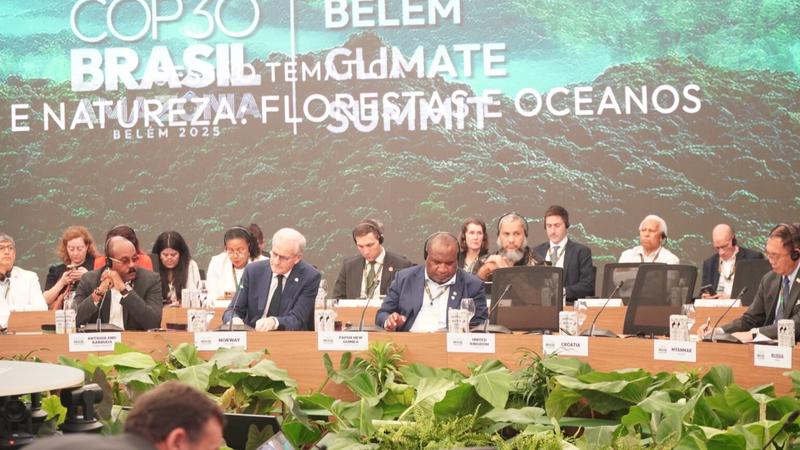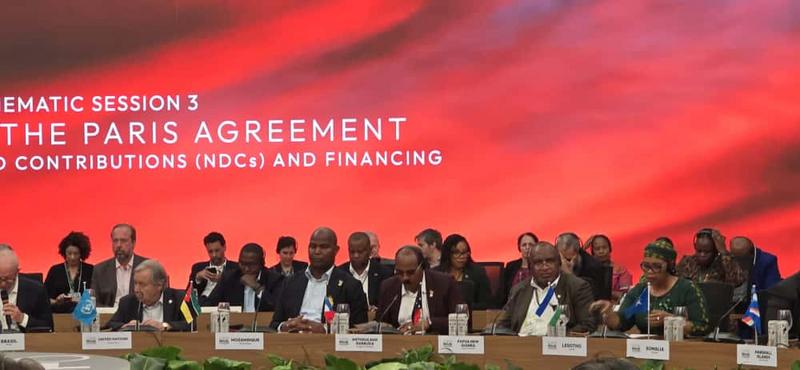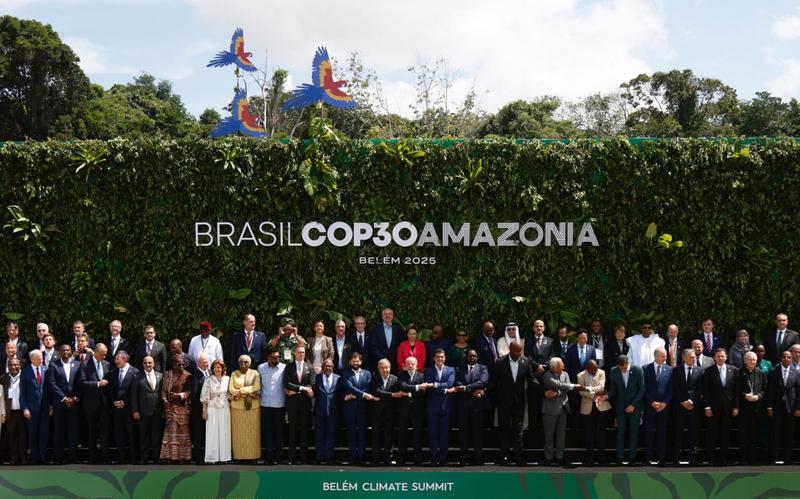Prime Minister James Marape of Papua New Guinea has called on world leaders to “act now and act responsibly” to save the planet, urging nations to honour their commitments under the Paris Agreement and embrace nature-based solutions as the foundation of global climate action.
Speaking at the World Leaders Climate Action Summit during COP30 in Belém, Prime Minister Marape said that for Papua New Guinea, “climate adaptation and mitigation is not a choice — it is a matter of survival”. His remarks positioned PNG as a global advocate for forest and ocean nations and highlighted the existential stakes for small island and forest-rich states.
Nature-Based Solutions at the Heart of Climate Action
PM Marape reaffirmed Papua New Guinea’s leadership in advancing Articles 5 and 6 of the Paris Agreement, recognising the critical role of forests and carbon markets in addressing climate change.
“Forests and oceans offer nature-based solutions and technologies to replenish Mother Earth,” he said. “Papua New Guinea safeguards 35 million hectares of pristine rainforest — the lungs of the Earth — and we offer this as our contribution and legacy to humanity”.
“This shows that even a small forest nation like Papua New Guinea can drive global impact,” he added, reinforcing PNG’s moral authority as a custodian of one of the world’s largest remaining tropical rainforests.
Forests and Oceans: The Twin Pillars of Survival
PM Marape emphasised that forest nations and ocean states like PNG bear the greatest brunt of climate change despite contributing the least to global emissions. “Saving the forest saves the Earth,” he said, citing WTO Director-General Dr Ngozi Okonjo-Iweala, who described the world’s rainforests as “atmospheric rivers that water the planet”.
He reaffirmed PNG’s commitment to ocean conservation, announcing the country’s intention to protect 30% of its ocean area from illegal and commercial exploitation, in line with the 30×30 initiative discussed at COP30.
“With 7% of the world’s biodiversity in our land and waters, the sustainable use of our oceans and forests is vital to saving this planet,” he said.

Global Partnerships and Indigenous Leadership
Prime Minister Marape acknowledged the support of the United Nations, the Green Climate Fund, France, Australia, the Coalition for Rainforest Nations, and the World Agroforestry Centre (ICRAF) in advancing PNG’s conservation agenda.
He also paid tribute to His Majesty King Charles III, President Xi Jinping, and UN Secretary-General António Guterres for their global leadership on forest and biodiversity protection. “Without saving our forests, trees, and oceans, the climate change conversation is redundant,” PM Marape said. “Technology is important, but without nature-based solutions, it cannot succeed”.
Solidarity Through Nature-Based Solutions
At a thematic session on “Climate and Nature: Forests and Oceans”, PM Marape emphasised that PNG, home to over 35 million hectares of tropical rainforest and vast marine resources, stands ready to contribute to global environmental preservation efforts.
“We must find solidarity in nature-based solutions to solve climate change,” he said. “Forests and oceans are our greatest allies — they preserve the air, regulate the climate, and sustain all life on Earth”.
The Prime Minister urged the global community not only to protect these ecosystems but to harness their power for sustainable development and carbon mitigation. “Papua New Guinea remains committed to preserving its forests and ocean resources. We have stepped up efforts to preserve our terrestrial and marine ecosystems as part of our contribution to the Paris Agreement and our shared planetary responsibility”.
He commended Brazil for hosting COP30 and championing forest-nation cooperation, noting that PNG and Brazil share a common destiny as custodians of the world’s largest tropical forest systems. “It is appropriate that we meet here in Belém — a city at the heart of the Amazon. Under President Lula’s leadership, we have seen great progress, including a 50 per cent reduction in deforestation in Brazil. This is an inspiration for all forest nations”.
PM Marape concluded by calling on the private sector and global partners to step up investments in nature-based climate solutions. “Let us unite around the forests and the oceans as two major solutions for a sustainable and liveable planet. Together, we can preserve the air, the land, and the seas — the lifeblood of our shared Earth”.
COP30’s Focus on Implementation and Climate Finance
COP30 highlighted the central role of forests and oceans in climate action, featuring initiatives such as the Tropical Forest Forever Facility (TFFF), strategies for protecting coastal and marine areas, and a drive to move from pledges to tangible, scalable implementation (Article 2).
Key initiatives included:
- Tropical Forests: Launch and mobilisation of the TFFF for long-term, results-based financing of tropical forest conservation.
- Oceans: Elevating oceans’ role, including the 30×30 initiative to protect 30% of marine areas by 2030.
- Connecting Forests and Oceans: Recognising the interdependence of these ecosystems in achieving global mitigation goals.
- From Promises to Action: Encouraging scalable, equitable solutions to ensure a just transition.
- Climate Finance: Highlighting the need for innovative, accessible financing, particularly in regions like Latin America, with outcomes including the Baku–Belém Roadmap (Article 2).

Urging Global Climate Finance for Forest Nations
At the Thematic Session on “10 Years of the Paris Agreement: NDCs and Financing”, PM Marape called for stronger global financing mechanisms to support forest and ocean nations. He stressed that tropical countries like PNG, Brazil, and the Democratic Republic of the Congo are “carrying the weight of the planet’s survival”.
“Forests and ocean nations are carrying the burden of the entire planet’s atmospheric balance,” he said. “The Amazon Basin, the Congo Basin, and the tropical forests of Papua New Guinea and Southeast Asia together form the lungs of the Earth. Conserving them is the greatest mitigation effort we can make to save humanity itself”.
He reflected on his journey, stating: “When I first began this journey, I thought I was fighting to save our forests. Now I realise I am fighting to save humanity. Our forests, oceans, and biodiversity sustain all life on Earth — and without them, we have no future”.
“There is no planet like Earth. Mars and Mercury are unlivable. Here, rivers, trees, mountains, and oceans sustain life. That is worth fighting for”.
Call for Nature-Based Climate Finance and Equity
PM Marape urged industrialised nations and multilateral partners to channel financing into nature-based solutions that value standing forests over exploitation.
“Our forests deserve proper conservation financing. Nature-based technologies must begin by valuing standing forests — not just harvested timber. One hectare of conserved forest can save the world far more than any industrial offset” (Article 3).
He called for a new era of equitable climate finance recognising forest nations’ contributions through jurisdictional REDD+ and carbon market systems under Articles 5 and 6 of the Paris Agreement.
European Commission President Ursula von der Leyen endorsed these approaches, highlighting carbon pricing as a powerful tool to drive emissions reduction and sustainable development.
Papua New Guinea’s Leadership and Partnerships
PM Marape reaffirmed PNG’s commitment to halting large-scale deforestation, restoring degraded lands, and supporting sustainable community development. “For six years as Prime Minister, I have been saying: stop deforestation. Bring real conservation that sustains livelihoods and protects humanity. If this generation of leaders fails to find real financing solutions for forest nations, history will judge us harshly”.
He highlighted PNG’s readiness to collaborate with global partners to operationalise long-term climate financing solutions and advance forest-nation diplomacy.
Strengthening Global Leadership and Climate Justice
Throughout COP30, PM Marape emphasised that forest and ocean nations are shouldering the planet’s survival. He commended UN Secretary-General António Guterres for his address, calling it “a moral compass for world leaders to act decisively in this decade of truth”.
“The 1.5°C limit is not a political target; it is a red line for humanity,” PM Marape said. He endorsed the call for a paradigm shift in global climate action, urging fossil fuel phase-outs, accelerated renewable energy transitions, and protection of tropical forests and oceans — the planet’s natural carbon sinks.
“Papua New Guinea stands shoulder to shoulder with the United Nations and forest nations like Brazil in protecting the lungs of the Earth. Our forests and our oceans are the greatest natural assets we can offer the world — and we must ensure that their preservation is matched with fair and equitable climate finance”.

Deepening PNG–Brazil Strategic Partnership
On the sidelines of COP30, PM Marape held bilateral discussions with Brazilian President Luiz Inácio Lula da Silva to strengthen cooperation in climate action, food security, and clean energy. President Lula praised PNG as a natural partner, describing both countries as “forest and ocean-rich countries with shared responsibilities in protecting the planet’s lungs”.
PM Marape stressed that despite their minimal carbon footprints, both nations are shouldering the global climate burden. “Our forests and oceans carry the world’s excess carbon, yet our people have not shared in the benefits of global carbon wealth”.
The two leaders agreed to:
- Establish diplomatic missions in each other’s capitals.
- Collaborate on tropical agriculture, renewable energy, and biodiversity conservation.
- Explore partnerships in hydropower, LNG, and clean energy technologies.
PM Marape also proposed Pacific-to-Amazon diplomacy, linking Pacific forest and ocean nations with Latin America’s environmental and agricultural powers. “We are connecting the Pacific and the Amazon — two of the world’s great forest regions — in a common cause for climate and sustainable growth” (Article 4).
He invited Brazilian companies to invest in PNG’s agriculture and energy sectors, noting that “Brazil’s agribusiness success can inspire PNG’s transformation into a food-secure exporting nation”.
Advocating for Climate Finance and Fairness
At the Leaders’ Thematic Session on NDCs and Financing, PM Marape called for an overhaul of global climate financing to reward conservation over deforestation.
“Our forests deserve proper conservation financing. Nature-based technologies must begin by valuing standing forests — not just harvested timber. One hectare of conserved forest can save the world far more than any industrial offset”.
He welcomed the Baku–Belém Roadmap, an initiative to mobilise US$1.3 trillion annually by 2035 for developing nations, calling it “a major step forward for climate justice, equity, and shared responsibility under the Paris Agreement”.
PM Marape endorsed the Roadmap’s Five Action Fronts (5Rs) — Replenishing, Rebalancing, Rechanneling, Revamping, and Reshaping — as a credible framework to unlock climate finance and reform global financial systems.
Papua New Guinea’s Global Standing
PM Marape’s leadership at COP30 demonstrated PNG’s rising influence as a bridge between the Pacific, ASEAN, and Latin America — regions united by natural capital and shared aspirations for sustainable development. He reaffirmed PNG’s commitment to halt unregulated deforestation, restore degraded lands, and protect 30% of its ocean area from illegal and commercial exploitation.
Under the Earth3 Platform, PNG is developing high-quality jurisdictional REDD+ credits to generate sustainable revenue while safeguarding ecosystems and supporting community livelihoods.
“For six years as Prime Minister, I have been saying: stop deforestation. Bring real conservation that sustains livelihoods and protects humanity. If this generation of leaders fails to find real financing solutions for forest nations, history will judge us harshly”.
He closed his week-long programme in Belém with an impassioned reminder: “There is no planet like Earth — rivers, trees, mountains, and oceans sustain life. Mars and Mercury are unlivable. This planet is worth fighting for. Let us save it together”.










